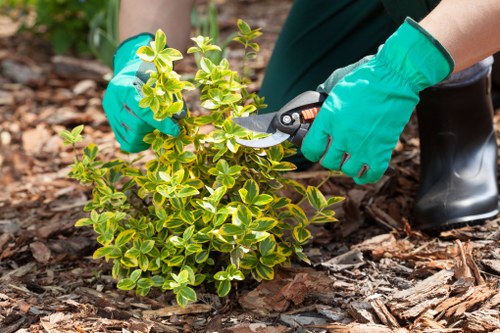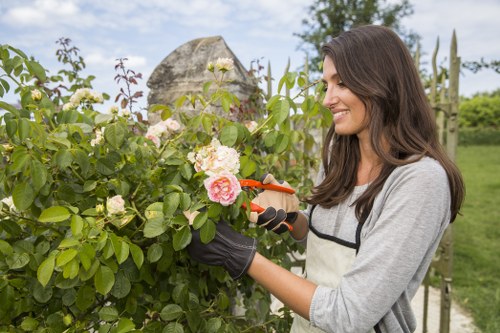Transform Your Outdoor Space with Expert Garden Landscapers in Garden Maintenance
Introduction to Garden Landscapers in Garden Maintenance

Garden maintenance has evolved into an art form where the expertise of professional garden landscapers is at the heart of every thriving outdoor space. In today’s fast‐paced world, investing time and effort into your garden not only enhances your property’s aesthetic appeal but also creates a healthy environment that nurtures nature. Garden landscapers in garden maintenance bring creativity, precision, and passion to every project, ensuring that every sod, shrub, and stone is placed with purpose. Their vision transforms simple green patches into living masterpieces that reflect both personal taste and sustainable practices.
Historically, maintaining a garden meant relying on traditional methods and seasonal routines. However, modern garden landscapers have redefined maintenance by merging timeless horticultural techniques with innovative technology. Today, professionals use eco-friendly fertilizers, water-saving irrigation systems, and reimagined planting designs to push the boundaries of outdoor beautification. Their techniques are not only environmentally responsible but also tailored to meet the unique needs of every garden, making each space a personalized retreat.
The shift towards hiring professional services for garden maintenance underscores a growing appreciation for expert care in outdoor design. It is no longer enough to simply mow the lawn and trim a few hedges; today’s landscape experts create sustainable systems that promote healthy plant growth and reduce waste. Their comprehensive approach ensures that the entire ecosystem is nurtured, resulting in a vibrant garden that showcases a meticulous blend of art and science.
The Essential Role of Garden Landscapers

The role of a garden landscaper extends far beyond just planting flowers and mowing lawns. These professionals are artisans and experts who use an array of techniques to improve soil health, optimize water usage, and select plant species that thrive in local climates. With their deep understanding of horticulture, they are capable of restoring even the most neglected yards into stunning living landscapes that complement the surrounding architecture.
Every garden project is unique, and garden landscapers in garden maintenance approach each task with a customized plan. They assess the environment, analyze the characteristics of the local ecosystem, and create designs that are both practical and breathtaking. This holistic approach ensures that every element of the garden, from tree placement to ornamental shrub design, works in harmony with nature. Additionally, their expertise in seasonal transitions prevents any abrupt changes, providing a steady evolution that is easy on the eyes.
Incorporating a blend of traditional craftsmanship and modern innovations, professional landscapers employ a range of advanced techniques to sustain garden health. They use organic compost, smart irrigation, and integrated pest management to offer solutions that address both immediate and long-term maintenance challenges. Their hands-on approach not only saves homeowners time but also increases the longevity and overall value of outdoor spaces while preserving the natural charm of the garden.
Innovative Techniques in Garden Maintenance

Innovation lies at the core of today’s garden maintenance practices. Garden landscapers are continually integrating state-of-the-art methods and equipment that streamline routine upkeep and enhance the overall visual appeal of gardens. These techniques include the implementation of sensor-based irrigation systems, automated lawn care, and the early adoption of eco-friendly practices that ensure minimal environmental impact. The fusion of technology with nature allows for gardens that are not only beautiful but also highly efficient.
Modern professionals are leveraging advanced design software and geographic information systems (GIS) to plan out each garden layout with remarkable detail. This meticulous planning process considers soil composition, sun exposure, drainage, and climate fluctuations, ensuring that every plant is placed in the optimal environment. Innovative techniques such as these are instrumental in creating sustainable and self-maintaining gardens that thrive year-round. By using precision agriculture methods adapted for small scale gardens, landscapers reduce water wastage and energy consumption.
Within many projects, garden professionals introduce specialized sections dedicated to high-tech advancements. For instance, a
Technological Advancements
section often highlights the benefits of automated irrigation, while aAutomated Irrigation
subheading dives into how timed water dispersal systems conserve resources. These informative segments not only educate homeowners but also underline the tangible benefits of embracing modern, smart garden maintenance methodologies that make routine tasks both efficient and effective.Eco-Friendly and Sustainable Practices in Landscaping

Sustainability has become a cornerstone in the realm of garden maintenance. Garden landscapers increasingly focus on eco-friendly practices that support biodiversity and reduce the carbon footprint of outdoor spaces. From the careful selection of native plants to the use of organic fertilizers, every decision is made with the environment in mind. These methods foster an ecosystem in which wildlife can flourish and nature retains its natural rhythm.
The use of organic compost and eco-friendly pest control techniques not only promotes a healthier garden but also minimizes the detrimental effects of chemical usage. Professional landscapers often advocate for techniques that promote soil regeneration and water conservation. By installing rainwater harvesting systems and smart irrigation setups, they significantly curtail water waste while simultaneously keeping plants adequately hydrated. This way, the garden becomes a living laboratory for environmental stewardship.
Moreover, many landscapers implement natural methods to combat common garden pests. For example, introducing beneficial insects and companion planting creates a balanced ecosystem that reduces the need for chemical pesticides. In designated sections, a
Natural Pest Management
strategy is often highlighted where organic methods are celebrated as effective and sustainable solutions. This commitment to eco-friendly practices not only enhances garden beauty but also protects and nurtures the world around us.Maximizing Your Garden’s Potential: Professional Maintenance Tips

To truly maximize a garden's potential, expert input is key. Garden landscapers provide a plethora of maintenance tips designed to ensure that every inch of your garden is optimally cared for. Their advice ranges from routine tasks such as pruning and mulching to more complex processes such as seasonal planting and soil testing. Emphasizing a combination of consistent care and creative design, these tips help elevate garden aesthetics while sustaining a healthy environment.
One of the critical strategies is to maintain a regular upkeep schedule, which brings several benefits including the prevention of overgrowth, reduction in weed proliferation, and improved plant health. An organized approach might involve a checklist that includes tasks like fertilizing, aerating the soil, and trimming overgrown branches. In many cases, professionals also recommend creating a garden diary to track seasonal changes, record plant progress, and plan for future improvements. This well-documented routine serves as both a maintenance log and a blueprint for ongoing garden enhancement.
In addition, professional garden maintenance entails a focus on resource efficiency. Homeowners may be encouraged to invest in sustainable tools and local expertise to reduce costs and environmental impact. Organized in a list format, some essential tips include:
- Regular pruning and weeding
- Seasonal soil testing and fertilization
- Installation of water-saving irrigation systems
- Use of organic and eco-friendly products
- Incorporating native plant species
The Future of Garden Maintenance and Final Thoughts
Looking ahead, the future of garden maintenance appears richer and more integrated than ever before. The advancement of smart technology coupled with a growing public interest in sustainable living signals a transformative shift in how we care for our outdoor spaces. Garden landscapers are at the forefront of this evolution, experimenting with intelligent systems that predict plant needs, adjust watering schedules automatically, and even monitor soil health in real time.
Moreover, the integration of digital tools with traditional landscaping techniques is creating opportunities for homeowners to actively engage in the maintenance process. Through mobile apps and online portals, property owners can now receive personalized recommendations and status updates on their garden’s well-being. This synergy between technology and nature not only promotes transparency but also empowers individuals to make informed decisions about garden care. As trends continue to evolve, the role of garden landscapers in integrating these advancements is more crucial than ever.
In conclusion, the vital contributions of professional garden landscapers cannot be overstated. Their innovative practices, eco-friendly approaches, and commitment to excellence ensure that every garden is a reflection of both nature’s splendor and modern ingenuity. If you’re looking to revitalize your outdoor space, contact us today to learn how our tailored garden maintenance services can transform your property. Whether you choose to book your service now or simply explore new ideas for outdoor living, step into a future where every garden thrives with potential.

